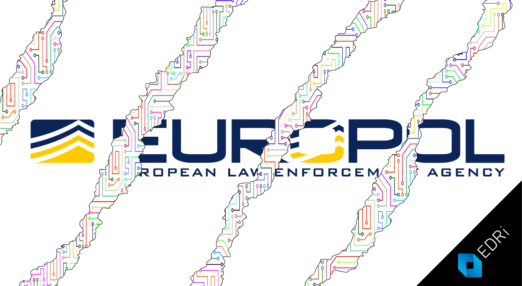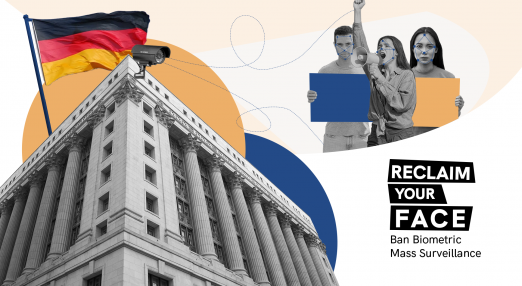Filter resources
-

The #PaperBagSociety challenge
The #PaperBagSociety is a social media challenge part of the #ReclaimYourFace campaign that invites everyone to share online the impact of living life with a paperbag on the head. With it, we aim to raise awareness of how ridiculous is to avoid facial recognition technologies in public spaces and why we need to build an alternative future, free from biometric mass surveillance.
Read more
-

How Europol’s reform enables ‘NSA-style’ surveillance operations
“More than 100 million”. That’s the number of encrypted messages that French and Dutch law enforcement announced they had collected after infiltrating Encrochat in 2020, a company selling encrypted communication services and devices, writes EDRi's Chloé Berthélémy.
Read more
-
Booklet: How online ads discriminate
The risks and harms that are associated with hyper-targeted online ads have been widely documented. Yet, the same amount of attention has not been shown to the many ways in which harms and risks of online advertising are unequally distributed, and how targeted online advertising can have discriminatory effects. This is the focus of EDRi’s newly launched report.
Read more
-

IuRe teams up with journalist to sue the Czech state for mobile phone data collection
The Czech state has been collecting data on the mobile communications of all its citizens. While the content of the communication remains unknown, other types of data are stored for six months through telecommunication operators. The stored data includes information on phone traffic and the locations of the internet connection. However, according to EDRi's member Iuridicum Remedium (IuRe), such large-scale data collection conflicts with European legislation. Therefore, together with investigative journalist Jan Cibulka, it has decided to sue the Czech state and demand an apology for illegal data collection.
Read more
-

Workplace, public space: workers organising in the age of facial recognition
‘Surveillance capitalism’ is increasingly threatening workers’ collective action and the human right to public protest.
Read more
-

Panoptykon ends campaign against uncontrolled surveillance reaching 3M people
1 out of 5 Poles are aware of the constantly growing powers of the Polish secret service. And this lack of knowledge from the public leaves the door open for further expansion of the powers of secret service authorities.
Read more
-

EDRi joins 178 organisations in global call to ban biometric surveillance
From protesters taking to the streets in Slovenia, to the subways of São Paulo; from so-called “smart cities” in India, to children entering French high schools; from EU border control experiments, to the racialised over-policing of people of colour in the US. In each of these examples, people around the world are increasingly and pervasively being subjected to toxic biometric surveillance. This is why EDRi has joined the global Ban Biometric Surveillance coalition, to build on our work in Europe as part of the powerful Reclaim Your Face campaign.
Read more
-

Europol inches closer to increasing its powers despite lacking accountability
Europol was caught breaking the law and developing new initiatives without any proper legal basis (e.g. Europol’s innovation lab). Many proposed changes to Europol's mandate show an attempt to legalise the agency’s unlawful activities. In addition, this revision is happening even before the first implementation evaluation of Europol’s Regulation, planned for 2022, has been carried out. Without this evaluation, it is impossible to assess whether the current rules impede the fulfilment of the Agency’s missions and whether its working practices respect fundamental rights.
Read more
-

Civil society warn against rushed global treaty for intrusive cross-border police powers
European Digital Rights (EDRi), Electronic Frontier Foundation (EFF) and 40 other civil society organisations urge the Council of Europe’s (CoE) Parliamentary Committee (PACE) to give them more time to provide much-needed analysis and feedback on the flawed cross border surveillance treaty recently approved by its Cybersecurity Committee (T-CY).
Read more
-

The urgent need to #reclaimyourface
The rise of automated video surveillance is often touted as a quick, easy, and efficient solution to complex societal problems. In reality, roll-outs of facial recognition and other biometric mass surveillance tools constitute a systematic invasion into people’s fundamental rights to privacy and data protection. Like with uses of toxic chemicals, these toxic uses of biometric surveillance technologies need to be banned across Europe.
Read more
-

New win against biometric mass surveillance in Germany
In November 2020, reporters at Netzpolitik.org revealed that the city of Karlsruhe wanted to establish a smart video surveillance system in the city centre. The plan involved an AI system that would analyse the behaviour of passers-by and automatically identify conspicuous behaviour. After the intervention of EDRi-member CCC the project was buried in May 2021.
Read more
-

Challenge against Clearview AI in Europe
This legal challenge relates to complaints filed with 5 European data protection authorities against Clearview AI, Inc. ("Clearview"), a facial recognition technology company building a gigantic database of faces.
Read more
